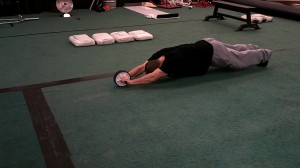5 Quick & Random Training Tips
1. How and when you do your abdominal training in a given week is actually fairly important. For example, if you decide to do standing rollouts 24-48 hours before a heavy deadlift session, chances are your deadlifts are going to suffer greatly, and perhaps even be risky to attempt (it will be much more difficult to stabilize your lumbar spine).
 This is because rollout variations place incredible eccentric stress on the anterior core, inducing large amounts of soreness and requiring a longer recovery period. The only caveat to this rule would be if your name is Ross Enamait.
This is because rollout variations place incredible eccentric stress on the anterior core, inducing large amounts of soreness and requiring a longer recovery period. The only caveat to this rule would be if your name is Ross Enamait.
Other abdominal programming faux pas I can think of would be pairing an anterior loaded barbell variation (i.e. front squat or zercher grips) with an ab exercise, and/or placing a hanging leg raise before or alongside a farmers walk. The former is a blunder because anteriorly loaded barbell movements already place considerable demands on the core musculature; the latter isn't the greatest idea because your grip endurance is going to become an issue. Spread them apart to receive the maximum benefit of each.
2. If squatting is problematic for you, you don't need to force it. At least not initially. While the squat is a phenomenal movement and undoubtedly should be a staple in one's strength and conditioning program, I'm finding that more and more people need to earn the right to back squat safely, much like the overhead press. This may be due to structural changes (i.e. femoroacetabular impingement) or immobility (i.e. poor hip flexion ROM or awful glenohumeral external rotation and abduction).
If this is the case, simply performing a heavy single-leg movement as the first exercise in the session will work perfectly. You can use anything from forward lunges to bulgarian split squats, but my favorite is probably the barbell stepback lunge with a front squat grip.
You're still receiving the benefits of axial loading due to the bar position, you can still receive a healthy dose of compressive stress in your weekly training (if you're deadlifting), and yes, you'll still be exerting yourself. I recommend performing these in the 3-6 rep range to allow for appreciable loads.
And, keep in mind, when I said "if squatting is problematic" at the beginning of point #2, I was referring to structural, mobility, and/or stability abnormalities that may make it unsafe for you to squat for the time being. I wasn't, of course, implying that if it's "just too hard" that you shouldn't do it. There's a pretty thick line between one being contraindicated for an exercise and someone who's simply unwilling to to do a lift because it takes mental+physical exertion.
3. If your wrists bother you while doing pushups, try holding on to dumbbells. It will take your wrist out of an extended position into more of a neutral one, greatly reducing the stress on that joint.
 I also like holding on to dumbbells because they allow you to use a "neutral grip," thus externally rotating the humerus, giving your shoulder more room to breathe.
I also like holding on to dumbbells because they allow you to use a "neutral grip," thus externally rotating the humerus, giving your shoulder more room to breathe.
4. Think twice before consuming dairy as your pre-workout fuel. This may seem obvious, but frankly I still talk to people who consume cereal before a morning workout, or down milk shortly before an evening training session. Your stomach isn't going to like this while doing chest-supported T-Bar rows, anti-extension core variations, or anything for that matter.
Another tip: don't shove a bunch of doughnuts down your pie hole before training. I thought this one would be no-brainer, but I actually had a kid vomit after pushing the prowler at a sub-maximal intensity. Upon asking him what he ate beforehand, he said, "Umm, well nothing all day, and then I ate a bunch of doughnuts before coming here." Fail.
5. Figure out for yourself what training split is best for you personally. For example, I feel that training upper body the day before lower body affects me (negatively) more than if I do it the other way around. However, I know others who feel the exact opposite. Also, for those of you who utilize a bodypart split, and train deadlifts on "back day," be sure to take into consideration when and how you'll do squats on "leg day," due to the beating your spine will receive from both exercises.





